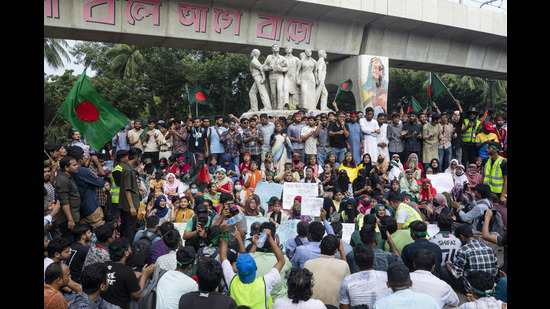Aug 13, 2024 09:21 PM IST
The geopolitical implications of this crisis go beyond immediate bilateral concerns. Bangladesh’s strategic position and its ties with China add significant complexity to the situation
The fall of Sheikh Hasina’s government in Bangladesh presents India with a complex diplomatic and strategic challenge. With the shift in the political landscape of Bangladesh, India must navigate a new reality, balancing its historical alliances with evolving dynamics. This crisis underscores the delicate interplay of regional politics, international interests, and the implications for India’s own strategic interests.

Hasina’s 15-year tenure as Prime Minister (PM) of Bangladesh ended abruptly amid escalating protests and violence. What began as student-led demonstrations over a high court ruling on the controversial quota system quickly spiralled into a broader anti-government movement. Hasina’s administration responded with crackdowns, leading to significant loss of life and intensification of the unrest. The upheaval revealed the vulnerabilities of Hasina’s long-standing rule. Despite her firm control over the government, she failed to gauge the depth of discontent simmering beneath the surface. The crisis took a disturbing turn with sectarian violence, including attacks on the Hindu minority. This has implications for India, including the risk of a refugee influx.
The protests had garnered broad support from various segments of society. Hasina’s heavy-handed response not only failed to suppress the protests but also opened avenues for Opposition forces to exploit the situation. The Bangladesh army grew increasingly uneasy with the government’s approach. This discontent led to a rather extraordinary intervention — the army asking Hasina to flee, preventing further bloodshed and avoiding a potential violent overthrow of her government.
For India, Hasina’s ouster presents a challenging conundrum. She has been one of India’s most reliable partners in the region. Her government cooperated with New Delhi on a range of issues, from counter-terrorism to trade and connectivity, and her alignment with Indian strategic interests made her an invaluable ally. However, her downfall has forced India to confront a difficult reality: the need to navigate a rapidly changing landscape in Bangladesh without jeopardising its long-term interests. India has granted her temporary asylum. Should the former Bangladeshi PM be unable to secure permanent asylum elsewhere, her extended stay could complicate India’s relations with Bangladesh. The new government may launch an investigation into the violence that resulted in numerous deaths and could potentially seek her extradition from India. And, any attempt to wash its hand off Hasina could influence other regional leaders who have traditionally aligned with India, potentially leading them to question the reliability of Indian support.
The geopolitical implications of this crisis go beyond immediate bilateral concerns. Bangladesh’s strategic position and its ties with China add significant complexity to the situation. China has been a key defence supplier to Bangladesh, providing submarines, warships, and support for a new naval base designed to accommodate substantial naval assets. Additionally, China has extended a considerable amount of loans to Bangladesh. The potential for increased Chinese leverage and Bangladesh’s possible use of this relationship to counterbalance India necessitates a careful approach.
India’s approach to the crisis must be both strategic and adaptable. It must engage with the caretaker government and other emerging leaders in Dhaka to preserve its strategic interests. If the caretaker government or an eventually elected one proves less friendly, India must convey its red lines and ensure that its interests are safeguarded.
Potential humanitarian issues, such as a refugee influx resulting from the violence against minorities in Bangladesh, could strain India’s resources and domestic stability. India has pressed the new government to contain the violence. It should also work to prevent violence against Awami League leaders and their cadre as they are in significant numbers and influence and are friendly with India.
The political upheaval in Bangladesh marks a pivotal moment not just for the nation but for regional dynamics as well. As Hasina’s departure signals a quantum shift, India’s response will need to be both measured and proactive, engaging constructively with the new Bangladeshi leadership. The crisis once again highlights the unpredictable nature of South Asian politics — the fragility of political regimes and the rapid shifts that can occur. For India, it underscores the necessity of engaging with a range of stakeholders while upholding its own strategic objectives.
The coming months will be critical in shaping the future of India-Bangladesh relations. The path forward will demand agility and diplomatic skills as India adjusts to the changes.
Yusuf T Unjhawala is adjunct scholar, Takshashila Institution. The views expressed are personal


